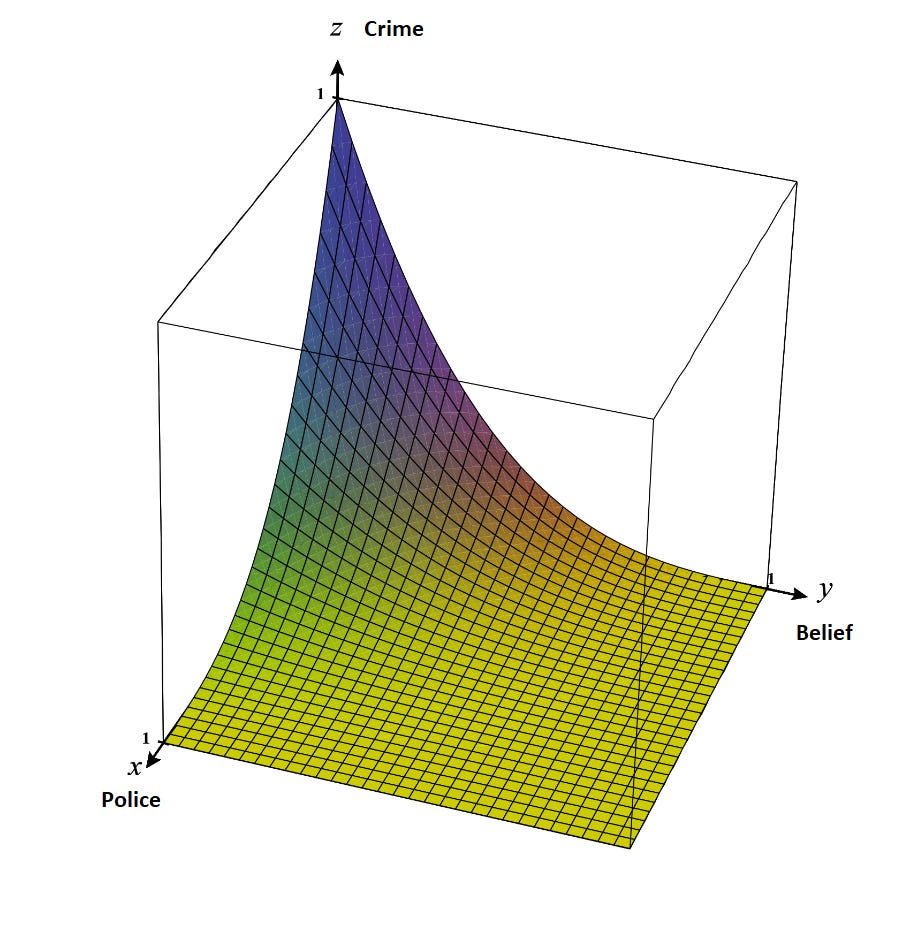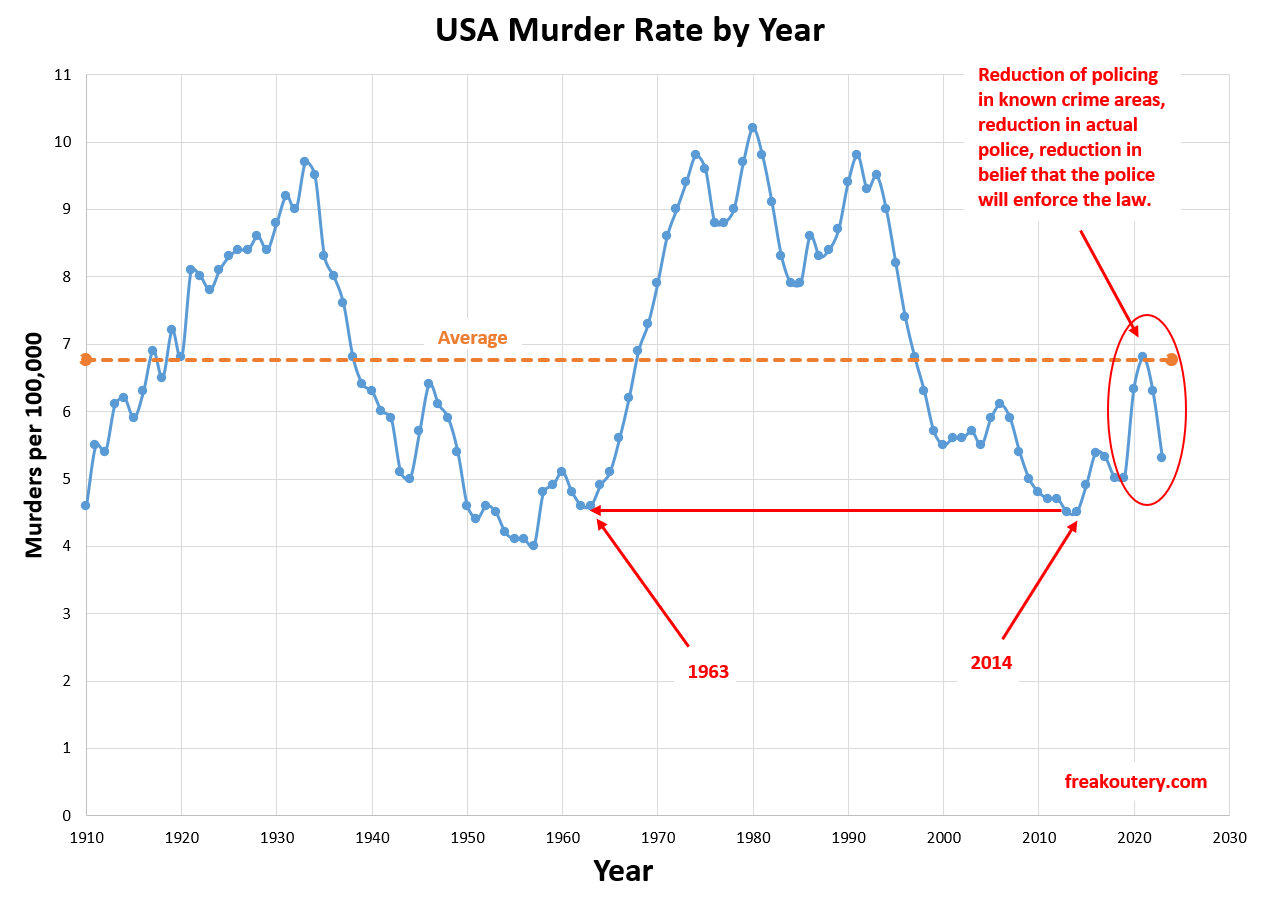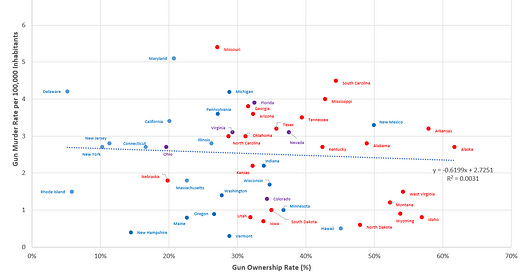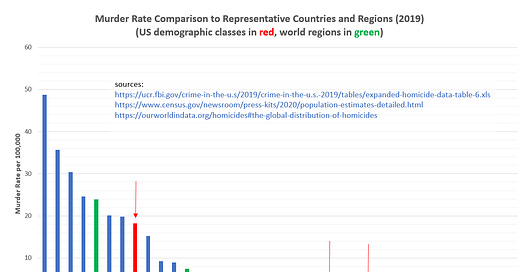
On Cops, Belief, and Chainsaw Faced Robot Dogs
We’re building a worse version of something we already had to fix broken things that are our fault.
About a year ago I attended one of these “rationalist” meetups – things that smart atheist-leaning antisocial-leaning folks throw to try and socialize among others with similar qualities. They’re fun. We were discussing crime. One of the gentlemen there, whom I had only met once or twice, indicated that he was excited about ubiquitous police surveillance because it would create a safer environment in which to live, an opinion which provoked a great wailing and gnashing of teeth from the civil libertarians attending. During the ensuing verbal melee, I couldn’t stop thinking about religion.
The efficacy of religion is a difficult concept to explain to an atheist who abides by the Yudkowsky edict stating “that which can be destroyed by the truth, should be.” Should it? I believe Eliezer Yudkowsky, in his newly minted AI alarmist and anti-AI activist role, is finally feeling the pressure of Chesterton’s Fence, staring down the barrel of the second order effects of his own belief system. I also think the ubiquitous surveillance case could be a good way to prime the pump on that conversation, which ties directly to the modern AI Alignment debate which embroils Yudkowsky. Let’s walk through this with some boundary case hypotheticals about crime, extrapolate to the general case about crime, and jump to the truly general case about “all things” at the end.
Chainsaw-Faced Robot Dogs
Consider the hypothetical Town of Robotnik. Robotnik has a surveillance camera on every street corner, and within every room of every home, networked to a central computer. The central computer contains a log of everyone’s ID and likeness. The cameras use facial recognition software to log everyone’s movements. The cameras report all movements back to the central computer, which creates a real-time map of every single thing every person in Robotnik does, and verifies that the things they’re doing are legal according to a code of behavioral regulations. Every time anyone breaks a significant law, such as stealing or murder or rape or embezzlement, a pack of Boston Dynamics Robot Dogs with chainsaws for faces immediately gets airdropped by automated quadrotor drones to the location of that person, and the dogs saw off the perpetrator’s limbs. The entire system is automated.
We might call Robotnik an “absolute police state.”
This would be a very peaceful city in which to live, because everyone would fear the chainsaw- faced robot dogs. After a few years of this there would be no crime, because the fear of the chainsaw dogs would govern everyone’s behavior. Crime would be “solved.” But there’s another way to do it.
Imaginary Chainsaw-Faced Robot Dogs
Consider the hypothetical Town of New Robotnik, which has surveillance cameras and robot dogs just like Robotnik does. But in New Robotnik a mysterious figure turned the AI off after a while. The cameras are still there, but they feed no information back. The robot dogs still exist, but their batteries aren’t charged. The airdrop quadrotors which deploy the robot dogs are broken, but nobody notices because they never fly anyway. They don’t fly in Robotnik either because everyone is so peaceful.
The results are the same. The robot dog doesn’t eliminate crime, fear of the robot dog eliminates crime. The fear is the same in both Robotnik and New Robotnik, so the actual enforcement mechanism still works.
We might call New Robotnik an “absolute belief state.” There are no actual police, but everyone believes there are.
Stop and think, for a moment, which town you would prefer to live in. Both have zero crime. Only one has operable automated chainsaw-faced robot dogs. I would choose New Robotnik even if I had secret knowledge that the robots didn’t work there, purely because the town was safe due to the fear everyone else still carried of the dogs.
Chainsaw-Wielding Tooth Fairy Demons
Now consider a third hypothetical town, Toothfairyville. Toothfairyville has the same set of laws as Robotnik and New Robotnik, but the laws are called “commandments.” Toothfairyville has no cops. Every person in Toothfairyville goes to a building once a week where they are indoctrinated from birth that the Tooth Fairy is constantly watching everything they do in public and private from a hidden sky castle made from the teeth of children. These indoctrinations state that any violation of the commandments will be met by a flaming fairy demon with chainsaw hands materializing and sawing off their limbs. Because of the strength of the indoctrination program, every single person in Toothfairyville believes this to be absolutely true, and the fear of the chainsaw demons guides their actions, without need for any sort of real commandment enforcement mechanism at all.
The results are the same. The chainsaw wielding tooth fairy demons don’t eliminate crime, because they don’t exist. Belief in the chainsaw wielding tooth fairy demons eliminates crime. Toothfairyville doesn’t even need surveillance cameras that don’t work, or robot dogs that aren’t charged, or broken quadrotors, to elicit the same sort of behavioral response we see in New Robotnik.
Toothfairyville is also an “absolute belief state.” There are no actual police, but everyone believes there are police-like things. You should realize at this point that we’re talking generally about religion, and about the state of human civilization for tens of thousands of years. This system worked.
Stop and think for a moment which town you would prefer to live in. All three have zero crime. One has operable automated chainsaw faced robot dogs and ubiquitous surveillance, one has a defunct version of the same, and one believes in the tooth fairy. I’d choose Toothfairyville.
Now let’s apply the Yudkowski edict, originally attributed to P.C. Hodgell, to these three towns. “That which can be destroyed by the truth, should be.” Should it? The best town of the three to live in is Toothfairyville, but when Yudkowski stumbles through the door and upends the tooth fairy indoctrination program, Toothfairyville explodes into anarchy owing to its lack of cops. Once that town goes down in flames, Yudkowski migrates to New Robotnik, lets them all know the enforcement system is broken, and again that town goes up in flames. Robotnik now has an immigration problem, because everyone from the other two towns flees their anarchy-ridden homes where perfectly good systems of peace have been destroyed by Yudkowsky’s Steamroller Of Truth. And the only solution is a ubiquitous police state.
This is one of many important operational connections between civil liberties and religion. Religion is a millennia-old system of social peace and order that keeps you from needing a kabillion cops. Ubiquitous religion is the only path to “defund the police” I see without an increase in crime.
Imperfect Systems of Police and Belief
I can hear you through the monitor. One of you is screaming “your hypotheticals are trash because there is no such thing as a perfectly adopted belief system or a perfectly adopted police state.” Another of you is screaming “but what happens when someone tests the boundaries of belief and discovers that the chainsaw dogs are broken or the tooth fairy doesn’t exist?” I yield to these legitimate criticisms, as the hypotheticals were obviously absolutes. The first hypothetical is an absolute police state, the second and third are absolute belief states. In practice, crime is in part a function of how many “police” a culture has, and how much “belief in enforcement” the culture has. The two form a function, where 100% policing yields no crime, 100% belief in enforcement yields no crime, less than 100% of both yields some crime, and 0% of either gets you a shit pile of crime. The function might look something like this, with the graph peaking where all potential criminals are committing crime:
The United States crime wave of 2020 and 2021 is a golden example of this. Our religiosity quotient stayed relatively constant through those two years, but the willingness of the cops to police dangerous areas of town went down, the actual number of police went down, the trust in police went down, and the belief that the police were going to enforce anything went down, so crime went up. We lost on both axes through those two years, causing a murder spike, among other crimes.
Now the murder spike is dropping, but none of the conservatives want to admit it’s dropping, and the liberals don’t seem to know why. It’s because the cops, and the belief in the cops, came back.
Generalizing to All Things
Why do we have nuclear weapons? Why is nationalism a thing? Why did we kill the whales to make margarine? The “rationalists” describe the answer to these questions with the word “Moloch,” the tendency of complex game theory systems to devolve to Nash Equilibria we don’t want as a society, which require societal wide coordination to fix or repair. The Tragedy of the Commons, an earlier formulation of the same basic thing, traces its roots to 1833 and crops up everywhere in economics and sociology.
The rationalists struggle at every turn figuring out how to get society to coordinate behavior that will be positive. The answer to whale depopulation was treaties, enforceable by international law, buttressed by nation states, which act as … cops. The answer is always a higher level of cop. But when it comes to things like international environmental policy, or an end to war, there’s no higher level of cop unless the UFOs rescue us from ourselves.
Because religion doesn’t update quickly, it’s hard to slide “thou shalt not kill whales” or “thou shalt not enrich uranium” into the commandment list. But if it was there and universally adopted, nuclear weapons might never have been developed, and we might still have whales. This is every bit the “coordination problem” that “thou shalt not steal” is, and we mostly don’t steal.
Some folks in the modern AI debate are hoping AI can be the new higher level of cop, and some take that conclusion to very disturbing limits. But the answer has been staring them all in the face the entire time. Mankind has already substantially solved “coordination problems,” and the Yudkowskys of the world destroyed the solution: religion. Now Yudkowsky’s friends are building the AI to become a worse version of something we already had. Yudkowsky fights them furiously, but Yudkowsky’s preconceptions prevent him from seeing the obvious solution to the second order effects of his own belief system.
The trick isn’t to build a higher order cop. The trick is to either build a better religion, or update a legacy one to deal with our new problems, or tweak one to have a quicker update mechanic than a Council of Nicea every five centuries.
But who do we trust to do that?


















I realize that this entire mental exercise, including its characterization of religion, is somewhat tongue in cheek. But it's important to note that the fear of punishment doled out by an omniscient God only goes so far in preempting sin, and people are very adept at convincing themselves that they are doing God's will, whatever they're contemplating. The real value of religion or a guiding philosophy (e.g., Christianity, Stoicism, Buddhism) is how it foments inner restraint and even molds a person's desires. At best, it can even instill within a person the courage to stand against evil. The despot imagines that he has all authority, because he has all the weapons and security forces. The believer sees a higher authority. If you're watching Shogun on Hulu, take note of how Mariko is guided by her deeply held beliefs, and how she summons the courage to defy Ishido in the end. There's far more to the history of human beliefs than can be captured by a cartoonish materialistic conception.
Maybe tangentially, maybe not, but the imaginary chainsaw faced robot dogs reminded me of the ‘fake bomb detector’ scandal of the Iraq war.
Checkpoints were issued with ‘bomb detectors’ which were nothing more than toys. Someone paid a lot of money for them. Someone made a lot of money from them. Obviously they didn’t work.
But did they? It seemed to me that if everyone manning the roadblocks, the army, and everyone travelling through the roadblocks, the insurgents believed they worked, then they worked.
The army would use them to ‘scan’ vehicles. The insurgents would avoid carrying bombs in cars for fear of being ‘scanned’. It was a system based on belief. And it worked.
Until it didn’t. And loads of people got killed by a bomb. And some guy went to prison. But for a while there…..
here’s a link to an unpaywalled version of the story. https://www.theguardian.com/uk/2013/may/02/fake-bomb-detector-conman-jailed